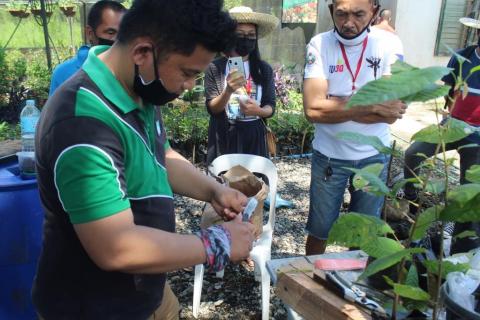Participants of Training on GAP for Cacao Production perform their hands-on activity on grafting at Butuan City Demonstration Farm on June 25, 2021.
LOS ANGELES, Butuan City – Geared toward the strengthening of the agricultural extension sector, the Agricultural Training Institute – Regional Training Center (ATI-RTC) XIII conducted the Training of Trainers (TOT) on Good Agricultural Practices (GAP) for Cacao Production last June 23-25, 2021 with 13 participants from Caraga Region.
The three-day training aims to discuss the overview of cacao industry and status and prospects of the industry and marketing opportunities, explain the elements of of GAP, enumerate the cultural management practice of cacao; identify and discuss the pests and diseases of cacao and their control measures, discuss the harvest and post-harvest management of cacao, demonstrate and perform cacao cultural management during field visit, and formulate and present a re-entry plan.
Dailinda M. Mamalis, Agriculturist II of Department of Agriculture (DA) – Caraga Region Office, presented the cacao industry situationer and marketing opportunities. On the other hand, three personnel from the Butuan City Agriculturist Office discussed the following: Joan Dela Torre - Agricultural Technologist and Cacao Specialist, explained the basics of GAP and its guidelines; Eric B. Ancheta – Cacao Specialist and High Value Crops Development Program (HVCDP) focal person, presented the cultural management practices centered on the factors of genetics, environment, farm management, and pests and diseases; and Melanio Catayas Jr. - Agricultural Technologist, expounded the topic on Post Harvest Handling and Fermentation.
The said participants were composed of Agricultural Extension Workers (AEWs), farmers, and youth or young farmers. They visited the Butuan City Demonstration Farm where the hands-on exercises on grafting and pruning was conducted.
“My interest to bring awareness to the topics especially in the elements of GAP inspires me to share and educate other farmers who have little knowledge on this because somehow I know it will contribute to agricultural development in our country,” said Rolyn Jay G. Aca-ac, a young farmer participants from Magallanes, Agusan del Norte.

